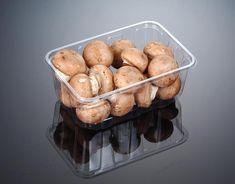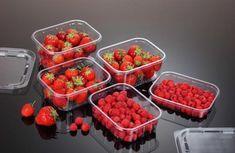


Since changing to private ownership and reverting to the name Sharp Interpack in mid 2002, the company has continued to go from strength to strength. Its core business continues to be fruit punnets and fresh produce trays for virtually all of the UK multiples, with increasing business in continental Europe. It is the exclusive supplier of punnets for soft fruit, tomatoes and potatoes to Marks & Spencer, as well as supplying additional trays for M&S's brassicas, mushrooms and legumes.
“We won the business with M&S as a result of being able to design packaging ranges that display and protect their produce well and fit into their new crating system, while still being cost effective,” explains Jeremy Sampson, Sharp Interpack's sales and marketing director. “We also use the most environmentally friendly plastic polymer polypropylene in a high clarity formulation.”
Environmental issues have been high on the agenda at Sharp recently, following the company's development of a range of biodegradable and waterproof thermoplastic food trays. The trays, which have been featured on the BBC's Tomorrow's World programme, are a composite of GM-free corn starch and natural polylactic acids and could help towards reducing the two million tonnes of plastic waste produced in the UK each year.
The material is as strong as PVC and polypropylene so it retains its properties during use but completely breaks down after about six weeks on a compost heap. As well as being used for trays, the composite can be used for covers and netting.
“The UK government's target to reduce plastic waste by 20 per cent within the next four years is a major factor driving the demand for environmentally friendly products,” says Sampson. “The key to our biodegradable packaging is that it completely degrades in a composting bin. This means that the consumer can dispose of fruit, vegetables and other organic matter together with the tray without adding to their normal household refuse.”
Tesco was the first UK supermarket to use the biodegradable trays for its organic fruit and vegetable range when it became commercially available in April 2002, following nearly two years of r&d work by Sharp. Since then, the packaging has also been introduced to Sainsbury's and the Co-op. Sharp is currently conducting trials with a number of other European supermarkets and is confident that the material will also be used for conventional produce in the near future, as well as meat, poultry and fish, chilled products and non- food display packaging.
“We see the use of biodegradable materials in our products as a huge leap forwards,” explains Sampson. “We are sure that, in time, this new technology will supercede the need for conventional plastic packaging and provide a cost effective, environmentally friendly solution that maintains integrity and shelf life.”
Another development that Sharp has brought in this year is the Sharpak SP range of fruit punnets. A further development of the Sharpak Metric range, the line features deeper packs which hold the fruit in place and allow for either use of a flat thermoformed lid or heatseal lidding.
“The packs are designed to protect the fruit and display it to its best effect on the shelf,” says Sampson. “The pack has a stackable SF500 lid which allows auto or hand-lidding at high speeds and a larger area for label or print. Extra ventilation is also provided via four punched slots at each edge of the lid which provide increased air exchange and therefore improved quality of produce.
“Freshness is an extremely important factor for us. We are currently carrying out an r&d project which is looking at how we can extend freshness by cutting down on waste in stores, therefore allowing riper produce to be sold successfully ñ this is looking very positive. Other developments that are planned for the future will continue on the theme of crate fit and will also involve the launch of other punnet and tray ranges.”
Since renaming itself Sharp Interpack, following a buy-out from the Malbak Group by a consortium led by Douglas de Jager, the former group chief executive, Sharp has concentrated on reinforcing its position outside the UK.
Over the last year the company has set up its own sales organisation in Europe and is supplying a number of major Dutch, Belgian and German packers with both standard and bespoke packs for fresh produce. Following a considerable amount of initial success with stone fruit packs, the main success of 2002 has been its herb packs. Four packs have been developed featuring an innovative hinged design which can be opened and closed a number of times. Tests on the packs showed up to a 400 per cent extension on shelf life compared to flow wrap packaging and mean that herbs stay fresh for up to 10 days instead of the usual two.
Sharp has also started to develop relationships with sister companies in South Africa and Zimbabwe and is investigating the local manufacture and supply of rigid fresh produce packs in these and other areas.
“The packs would be manufactured to British Retail Consortium (BRC) hygiene standards in Africa and this is something which all the European supermarkets desire,” Sampson explains. “We received accreditation from the BRC at the beginning of 2001, which was re-confirmed in January 2002. This demonstrated that our standards are of a high quality and that we adhere to strict levels of hygiene and safety.”
The technical standard for packaging requires the implementation of a formal hazard and risk management system, a documented technical management system including procedures for document control, internal audits, complaints procedures and supplier monitoring and the ongoing control of factory standards, products, processes and personnel. The scheme was formally launched in October 2001 by the BRC and the Institute of Packaging and is supported by most of the UK's major supermarkets. Suppliers were initially given deadlines of 18-24 months to comply, but Sharp Interpack was involved in the pilot programme for the scheme and was the first company to receive certification.
With new product development planned and increasing demand from major UK multiples and the leading European supermarkets, Sharp has invested in a range of equipment. An investment programme of £11m was completed in May 2002 and, since August of this year, an additional £3 million has been spent on increasing the production capacity at its Aylesham factory in Kent.
This has included the delivery of a third TFT 750 and a giant sized in-line polypropylene extruder and thermoformer. A complete case handling and conveyor system and raised packing area have also been installed at the plant. These improvements mean all products are taken through a number of post-production stages ñ from an improved packing and inspection environment, through metal detection, to being palletised ñ off the production floor, contributing towards increased efficiency.
Sharp's plant at Bridgwater, Somerset has a new leadership team in place and has also benefitted from a £3 million refurbishment programme, including the purchase of a large modern production/warehouse building at the rear of its existing plant. Further investment in 2003 will join these buildings together to create a fully integrated manufacturing site with positive product/materials flow.
“In the future we expect to see larger, more specialised companies offering a variety of total pack solutions to the major packers and supermarkets,” predicts Sampson. “With the reputation that Sharp Interpack has for innovation, and the company's commitment to continued investment and improvement, I am confident that we will be well placed to meet the future demands of all our clients.”



